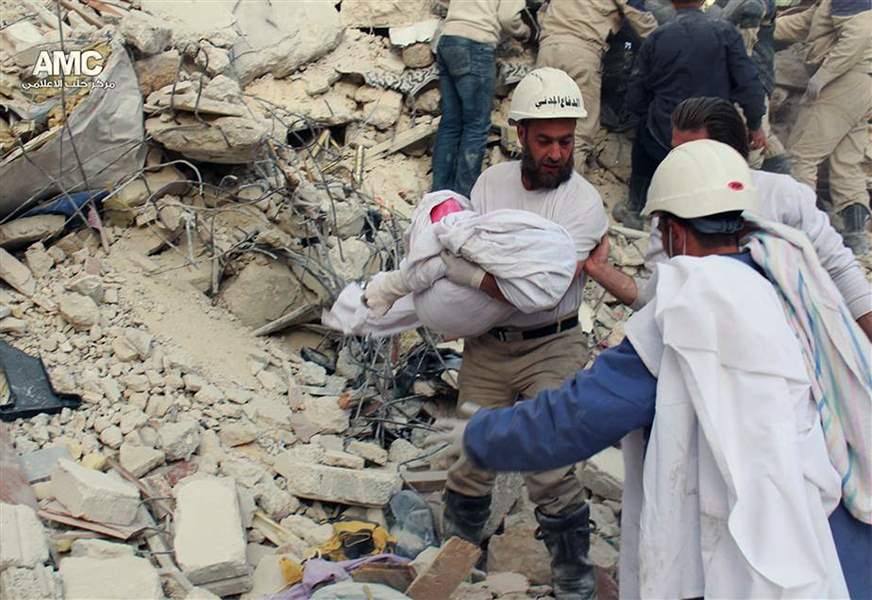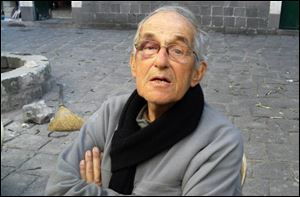
Gunman in besieged Syrian city of Homs shoots to death well-known Jesuit Dutch priest
4/7/2014
A Sunday, April 6, 2014 photo provided by the anti-government activist group Aleppo Media Center (AMC), which has been authenticated based on its contents and other AP reporting, shows civil defense rescue workers carrying the body of a victim of a Syrian government airstrike, in Aleppo, Syria. (AP Photo/Aleppo Media Center, AMC)
ASSOCIATED PRESS

Dutch Father Francis Van Der Lugt, 75, seen in this photo taken last month in Homs, Syria.
DAMASCUS, Syria — A beloved, elderly Dutch priest who made headlines this year with a desperate plea for aid for civilians trapped in the besieged Syrian city of Homs was assassinated today by a masked gunman who shot him at his monastery, the latest attack targeting Christian clergymen in the country’s civil war.
The killing of Father Francis Van Der Lugt — a Jesuit, the same order as Pope Francis — underscored fears among many of Syria’s Christian and Muslim minorities for the fate of their communities as Islamic extremists gain influence among rebels seeking to topple President Bashar Assad.
The 75-year-old Van Der Lugt, an Arabic speaker, had lived in Syria for 50 years and refused to leave Homs even as hundreds of civilians were evacuated from rebel-held districts of Homs that have been besieged for more than a year by Assad’s forces. Van Der Lugt lived in the monastery in one of those neighborhoods, Bustan al-Diwan.
He appeared to have been directly targeted in the early morning attack, according to several people who were in the monastery when the attack occurred. A single gunman walked into the monastery, entered the garden and shot him in the head, said Rev. Ziad Hillal.
“I am truly shocked. A man of peace has been murdered,” Hillal said in a phone interview from Homs with the Vatican Radio.
A person, who has lived in the monastery with the slain priest said he was buried in the convent’s garden late Monday. The person who passed the information of the priest’s burial on the phone did not want to be identified for fear of being targeted.
The motives for the attack were not known, and no one immediately claimed responsibility for the killing.
Over the past year, hard-line rebel groups, including the al-Qaida-linked Nusra Front, have become more influential and dominant among the opposition fighters in the central city, as in many other areas of Syria.
Another Jesuit priest, Father Paolo Dall’Oglio of Italy has been missing since July after traveling to meet Islamic militants who now rule the eastern city of Raqqa. A year ago, two Greek Orthodox bishops were seized from their car by gunmen outside the northern city of Aleppo and have been missing since.
An activist based in the blockaded rebel-held area of Homs said rebel fighters were shocked by the priest’s death.
“The man was living with us, eating with us, sleeping with us. He didn’t leave, even when the blockade was eased,” Beibars Tilawi said via Skype. Regardless of the rebels’ views toward Christians, the priest was well-liked for his efforts to get the blockade lifted and alleviate widespread suffering and hunger among civilians, Tilawi said.
The state news agency SANA blamed “terrorists” for the priest’s death but offered no details. The government uses the term for rebels.
Syrian’s main opposition bloc called the killing a “criminal act” and blamed Assad’s forces.
“We hold the regime ultimately responsible for this crime, as the only beneficiary of Father Francis’ death,” the Western-backed Syrian National Coalition said in a statement.
The government launched a punishing crackdown on Homs, pounding the gunmen holed up in the city’s central districts and encircling them with checkpoints, preventing food and medicine from reaching their areas. Hundreds have left the blockaded areas during a series of U.N. evacuation, but Van Der Lugt repeatedly refused to leave until all Christians were evacuated, his friends said.
U.N. Secretary-General Ban Ki-moon condemned the killing of the elderly priest as “an inhumane act of violence against a man who heroically stood by the people of Syria amid sieges and growing difficulties,” according to a statement released by the spokesperson for the secretary-general. Ban demanded that “the warring parties and their supporters ensure that civilians are protected, regardless of their religion, community or ethnic affiliation.”
It’s not immediately clear how many Christians remain trapped in rebel-held parts of Homs. In February, there were about 200 Christian families, according to Syrian Red Crescent figures at the time.
Van Der Lugt lived with 24 other Christians in the monastery. He sought to raise widespread attention to the suffering of civilians in blockaded Homs.
“Hunger defeated us! We can see its signs drawn over the faces,” Van Der Lugt wrote on Jan. 25 on a Syrian Christian Facebook group page.
“People are wandering the streets screaming; We are starving, we need food!,” the priest wrote in a statement published in English and French. “We are living a scary reality. Human beings turn into wild animals living in the wild.”
The friend said Van Der Lugt also fretted about the future of Christian properties inside rebel-held parts of Homs.
Albert Abdul-Massih, who worked alongside Van Der Lugt, said the slain priest held a doctorate in psychiatry and lived an austere life. His death is a big loss, he said.
“We learned humanity from him, and he used to love Muslims as much as he loves Christians,” Abdul-Massih added. “He was treating people for free and he was a fluent Arabic speaker.”
“He called me two days ago and told me that he is hopeful that the siege will end soon,” Abdul-Massih said.
Vatican spokesman the Rev. Federico Lombardi said the 75-year-old Van Der Lugt, was “a man of peace, who with great courage had wanted to remain faithful, in an extremely risky and difficult situation, to the Syrian people to whom he had dedicated, for a long time, his life and spiritual service.”
In Belgium, the secretary of the Dutch Jesuit order, Father Jan Stuyt, said the slain priest had been living in Syria since the mid-1960s and was on good terms with the country’s Muslim majority.
“He is like a martyr for the interreligious dialogue,” Father Jan Stuyt said in a telephone interview with AP in Brussels.